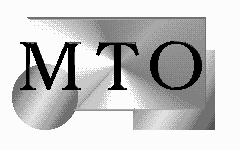
Music Theory Online
The Online Journal of the Society for Music Theory
![[Contents of vol. 4.3]](../../gifs/contents.gif)
![[MTO Home]](../../gifs/mtoh.gif)
![[SMT Home]](../../gifs/smth.gif)
![[MTO talk]](../../gifs/mtotalk.gif)
Volume 4.3:
Panos Vlagopoulos*
Music Theory in Greece
[1] Music Theory is taught at all three university music departments
in Greece: the Athens Kapodistrias University, the Aristotle
University in Thessaloniki, and the Ionion University on Corfu.
The following are examples of music theory courses taught at the
Ionion University (visit the Ionion home page
at http://www.uion.edu.gr/music/index_e.html): Introduction to
Music Theory (2 semesters), Historical Harmony (4 semesters),
Music Analysis (2 semesters), Music Analysis at the Piano (3
semesters), and Theory of Byzantine Music (6 semesters). Athens
and Thessaloniki offer roughly the same courses, with the
addition of preparatory courses in Harmony and Counterpoint.
Music theory courses are conceived as further elaboration of
knowledge acquired on the conservatory level one the one hand
and, on the other, as an introduction to music analytical
methods, especially Schenkerian and set theory. Most of the
people responsible for these courses were educated in England or
in the United States. Professor Theodore Antoniou, perhaps the
most representative example of such faculty, is an active
composer and university teacher in Athens and in Boston.
French-educated people, such as theorist and composer Charis
Xanthoudakis at the Ionion University, aspire to a more
artistically imaginative, semiotically orientated teaching style.
Understandably, much teaching time is devoted to the study of the
intricate Byzantine notation and theoretical modal system.
[2] Until 1990, music theory was traditionally taught exclusively at
the conservatories, which issue diplomas in Music Theory,
Harmony, Counterpoint, and Fugue. All Greek composers, from
Manolis Kalomoiris (1883-1962), the patriarch of modern Greek
music, to I. Ioannidis and M. Traulos, were educated at
conservatories. Many make a living by teaching in those
institutions and are thus responsible for a generally good level
of music theory teaching (unlike, alas, the situation of
historical courses).
[3] Musicological publishing in Greece comprises the following
periodicals:
Mousikologhia (Musicology), ed. by Oly Frangou-Psychopaidi
(professor at the Athens department, author of Griechenland in
the new MGG); first appeared in 1985 and is the major
musicological journal, and has published almost all Greek-writing
musicologists active in recent years (E.M.E.A., 12 Omonoia
square, tel: +301 3216645 / fax: +301 6466071).
Mousikotropies (a pun, combining the Greek words for musicology
and modulations), ed. by students of the Thessaloniki department
(attn.: E. Koliousi, Aristotle University of Thessaloniki,
54006 Thessaloniki, tel: +3031 995 899).
Mousa (the initials of the student organisation), ed. by the
students of the Athens department (attn.: A. Arkadopoulos,
Music Studies Department, Philosophy School, Athens 15784).
Ta mousika (Things Musical), ed. by B. Kallipolitis, is
more like the Musical Times or the Neue Zeitschrift fuer Musik,
and aims at a larger public of amateurs than a strictly academic
one.
[4] I would like to conclude this short report by referring to an
institution active in organizing open courses in music technology
and music analysis as well as presentations of living composers:
the Institute of Research in Music and Acoustics (IRMA; tel:
+301 3310129 / fax: +301 3224192). This year, for example, a
Composers Forum series was organised, in which composers of the
older generation, alternating with younger ones, lectured on
their aesthetic and compositional orientations, influences, and
aspirations, explained their musical system, and entered in
lively dialogue with what was mostly a public of fellow
musicians. The names of the composes presented are Arghyris
Kounadis (9 March), Konstantia Gourzi (23 March), Dimitri
Draghatakis (6 April), Minas Alexiadhis (27 April), and later
Ghiorghos Kouroupos (11 May), and the Amsterdam-based Kalliope
Tsoupaki (25 May).
Panos Vlagopoulos
Ionion State University
Music Deptartment
24 A. Sofias
Athens 17123
Greece
pvlag@admin.megaron.gr
 Return to Beginning
Return to Beginning
![[Contents of vol. 4.3]](../../gifs/contents.gif)
![[MTO Home]](../../gifs/mtoh.gif)
![[SMT Home]](../../gifs/smth.gif)
![[MTO talk]](../../gifs/mtotalk.gif)
Copyright Statement
Copyright � 1998 by the Society for Music Theory.
All rights reserved.
[1] Copyrights for individual items published in Music Theory Online
(MTO)
are held by their authors. Items appearing in MTO may be saved and stored in electronic
or paper form, and may be shared among individuals for purposes of scholarly research or
discussion, but may not be republished in any form, electronic or print, without
prior, written permission from the author(s), and advance notification of the editors of
MTO.
[2] Any redistributed form of items published in MTO must include the following
information in a form appropriate to the medium in which the items are to appear:
This item appeared in Music Theory Online
in [VOLUME #, ISSUE #] on [DAY/MONTH/YEAR].
It was authored by [FULL NAME, EMAIL ADDRESS],
with whose written permission it is reprinted
here.
[3] Libraries may archive issues of MTO in electronic or paper form for public
access so long as each issue is stored in its entirety, and no access fee is charged.
Exceptions to these requirements must be approved in writing by the editors of
MTO, who will act in accordance with the decisions of the Society for Music
Theory.
This document and all portions thereof are protected by U.S. and international copyright
laws. Material contained herein may be copied and/or distributed for research purposes
only.
prepared by
Jon Koriagin, editorial assistant
5/10/98

